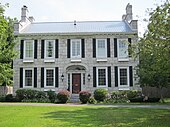Orville Hungerford
Orville Hungerford (born October 29, 1790 in Farmington , Connecticut , † April 6, 1851 in Watertown , New York ) was an American industrialist, banker and politician . Between 1843 and 1847 he represented New York State in the US House of Representatives .
Career
Orville Hungerford attended public schools in his home country. In 1804 he moved with his father to Watertown, Jefferson County, New York state. He later worked as a shop clerk in Burrville. He then returned to Watertown, where he worked in commerce. He later left the business to a partner while he received his dividend. In the early 1820s he was a member of the state militia. Hungerford also got into banking. He was a cashier from 1820 to 1833 and then president of Jefferson County National Bank in Watertown from 1834 to 1845 . Subsequently, he was still on the board of directors of this bank until his death. Hungerford was also involved in the industrial development of Watertown. For example, he helped found the Sterling Iron Company , Black River Woolen Company , and Jefferson County Mutual Insurance Company . Politically, he joined the Democratic Party .
In the congressional election of 1842 , Hungerford was elected to the US House of Representatives in Washington, DC , in the 19th electoral district of New York , where he succeeded Samuel S. Bowne on March 4, 1843 . After re-election, he was able to complete two legislative terms in Congress until March 3, 1847 . These had been shaped by the events of the Mexican-American War since 1845 . Hungerford was also a member of the Committee on Ways and Means from 1845 . In 1846 he was not re-elected. A year later he ran unsuccessfully for the office of New York State Comptroller . He was defeated by the later US President Millard Fillmore .
From 1847 until his death Orville Hungerford was president of the Watertown & Rome Railroad , in whose construction he was instrumental. However, he did not see the beginning of actual rail transport in his company. The first train did not leave until shortly after his death. He died in Watertown on April 6, 1851.
Web links
- Orville Hungerford in the Biographical Directory of the United States Congress (English)
| predecessor | Office | successor |
|---|---|---|
| Samuel S. Bowne |
United States House Representative for New York (19th electoral district) March 4, 1843 - March 3, 1847 |
Joseph Mullin |
| personal data | |
|---|---|
| SURNAME | Hungerford, Orville |
| BRIEF DESCRIPTION | American politician and entrepreneur |
| DATE OF BIRTH | October 29, 1790 |
| PLACE OF BIRTH | Farmington , Connecticut |
| DATE OF DEATH | April 6, 1851 |
| Place of death | Watertown , New York |

